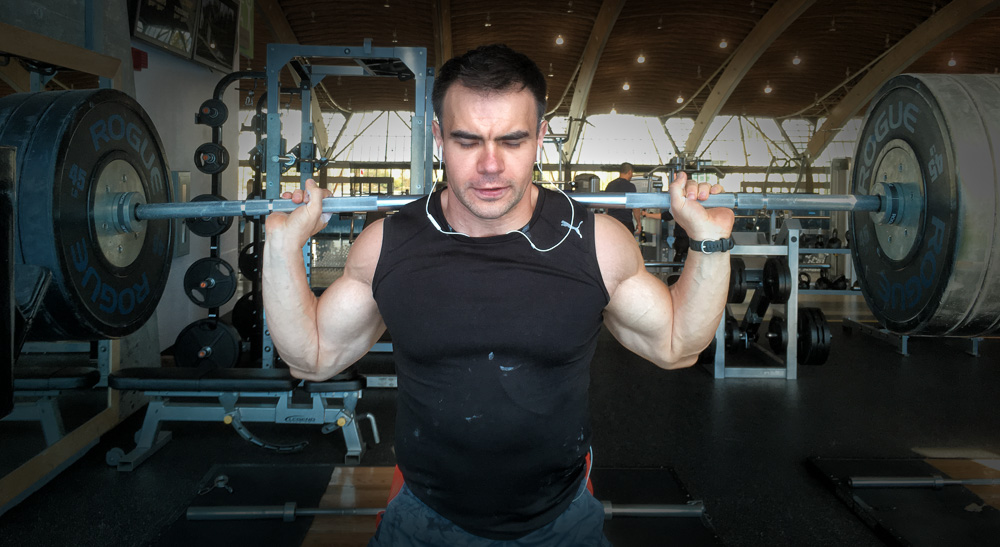At Science and Strength, we often get asked about our training, what we eat and how often; and then conversation turns towards busy schedules, children, deadlines and simply not having enough hours in the day to get it all done.
Many use the term “stress” to describe their jam-packed timelines filled with various responsibilities, priorities and tasks. Due to these circumstances, majority of people simply give up on their personal fitness and health, slowly sliding down the path of weight gain and increased risk of various cardiovascular and metabolic style diseases.
In this article, we’ll discuss what exactly is stress, where it comes from, and how it affects the body. Furthermore, we dive into how to approach this dark cloud and maximize on its benefits.
Stress is not a novel phenomenon
If you are feeling stressed on a regular basis, rest assure you’re not alone. Most of us undoubtedly face significant stress levels within day-to-day occurrences, be it at work, home, or elsewhere. It seems that stress is all around us and everyone is feeling a great deal of it. This predicament isn’t an exaggerated belief, but a product of external environment created by modern lifestyle along with individual body responses.
The good news, stress is not some modern-day disease that we can’t handle, it has always been around. If that surprises you, think about our ancestors who had to struggle and fight for their very own existence. Back then, hunter-gatherer faced many life-altering threats. Lack of food forced many to eat unknown and at times diseased plants and animals, leading to deadly consequences. Running away from predators who were bigger and faster than them, or chasing a large animal for survival of him/herself would certainly qualify as direct stressful encounters.
Food is a type of Stress
Today, we are still very much affected by food as a source of stress, just in a slightly different manner. We no longer have to hunt for food but rather drive ourselves to a local supermarket and fill our shopping cart with all kinds of foods that entice us with bright labels, and tug at our basic needs for sweet, salty and fatty. Many of the foods found in our diet today are no doubt tasty but also, nutrient-poor, deep-fried, and filled with excess sugar or salt. Abundance of sugar-sweet and/or alcoholic beverages further provide stress on our systems.
Modern-day forging and gathering, with little to no physical exercise also creates stress, but its effects are seen in stages. Consequences of our daily actions are not always clear and gradually increase by greatly impacting the body and mind. Nutrient-poor, “tasty” meals progressively work against our evolutionary design by disturbing many metabolic processes while depositing extra calories as undesired fat. Eventually after filling up adipose deposits, the body continues to store excess calories as fat in any available space such as arteries and liver. This unhealthy weight gain leads to obesity along with significant risks of high cholesterol, cardiovascular disease, metabolic syndrome and diabetes.
Modern-day stress is real, and it not only affects the body but also the mind. Statistics of mental health related illnesses show significant increases in reported cases of anxiety, depression and post traumatic stress disorder (PTSD).
The physical and mental health related problems continue to be on the rise. Having said that, stress is not all bad, and is the very catalyst that makes us Stronger, Leaner and Faster in many different ways. But, before we look at the positive side of stress, let us first define this beast.
What is Stress?
With numerous medical health risks associated with stress, the question remains as to:
What is this dark cloud that can impose serious damage on our body?
Stress is any kind of stimuli (thing or event) that generates a reaction within the body. What you’re feeling, is not the stress itself but rather body’s response attempting to overcome it.
The body may be subjected to many forms of stress including:
- seeing a bear during your trail hike;
- squatting a 300 lbs (~ 135 kg) barbell; or
- subjecting yourself to a low-calorie diet.
In each above example, the body identifies type of stress and creates physical or mental effort in order to conquer it—increasing CNS function by activating more motor units (MUs) and using own energy supplies.
Essentially, recruiting more muscle fibers to produce bigger and stronger contractions to:
- run away from the bear;
- perform a heavy barbell squat; and
- responding to the low-calorie diet by tapping into stored energy (glycogen and fat) in order to maintain daily functions.
General Adaptation Syndrome (GAS)
This evolution based body response was first studied and described by Dr. Hans Selye in 1950s. Selye named it General Adaptation Syndrome (GAS), stating that stress is an inevitable part of life and can lead to positive or negative body states.
GAS has three stages describing the body’s response through:
- Alarm stage – body’s initial identification of danger to its homeostasis. The body recognizes stress and unleashes a slew of hormones that lead to fight-or-flight response.
- Resistance stage – body continuing to resist stress and trying to conquer it. Hormones like cortisol and catecholamines (adrenaline, noradrenaline and dopamine) continuously fuel the fight against imposed stimulus; while sending feedbacks regarding spent energy and the need to continue.
- Exhaustion or Recovery stage – fight-or-flight always comes with high energy costs thus, the body can’t sustain such process for too long. Depending on each system, body eventually begins to run out of steam, slowing down or stopping its combat tactics. If stress has been eliminated, the body transitions into recovery stage by pushing all available resources (sugar, fat and any other nutrients) into blood circulation for repair, recovery and regeneration processes. However, if stress has not been eradicated and the body is no longer able to fight—exhaustion phase takes place. Here, stimulus overtakes the body through overload, leading to extensive fatigue, burnout, health problems and illnesses.
Too Much Stress can break you!
Stress is not a one dimensional entity, as the type and duration of stimulus are both important vectors towards body’s successful response. Different pressures, tensions and stressors greatly affect internal environment (homeostasis), creating peaks and valleys within the metabolic rate.
Some stress can clearly be too great for the body to handle. For example: coming into the gym for the first time and trying to squat 300 lbs (~135 kg) in that session will likely result in a failed lift, or worse—a significant injury. The 300 lbs bar for an untrained body is simply too great of a physical stress.
The same is true for quitting certain sugary, salty or fatty foods “cold-turkey” utilizing a low-calorie diet. Here, initially the body will engage and resist but eventually breaks down by displaying physical symptoms of irritation, headaches and hunger. Cognitive ability also suffers by feeling anxious, depressed and having tough time remembering things.
Smaller, continuous doses of stress may not be as evident however, they too have a lasting negative impact. Chronic stress does not allow the body to complete full repairs, leading to significant damage within the nerve, muscle and organ tissues. If unresolved, the body continues to fall further behind, deteriorating and developing all kinds of physical and psychological issues.
If only we can be like Zebras
As the saying goes, too much of anything is not a good thing. This is the same with stress. As seen with Selye’s GAS model, the body is designed to identify and engage any stimulus that threatens to disturb its balance (homeostasis). However, significant levels or periods of stress can cripple the body’s ability to react and outlast faced challenge. So, the question remains:
If stress is as old as evolution itself and we have the tools to deal with it; then why are we suffering from its effect more than ever?
Dr. Robert Sapolsky provides some explanation in his book “Why Zebras Don’t Get Ulcers”. Its an interesting read with copious amount of science based information, but the premise of the text is: our inability to “turn-off” the response from day-to-day engagements. You see, zebras are a fine physical specimen with great musculature, speed, and power. Zebras face the stress of being eaten by predators on the African plains as their bodies engage in the truest form of the fight-or-flight response during such encounters. However, zebra’s stress periods are fairly short, about three minutes, give or take. The result, either survival from the attack with gained experience, or death. After such near death experience, zebras go back to grazing and doing whatever zebras do, while forgetting the screaming terrors of deadly chase only few minutes ago.
Human beings also engage in fight-or-flight actions when encountering stress, but unlike zebras, we don’t turn it off after everything is said and done. We constantly think, worry, fear the unknown and obsessively stress over future encounters (whatever they may be). This ongoing psychological bombardment in the minds of the many generates chronic stress levels, leading to internal imbalances, lower immune response and eventually greater health concerns.
Benefits of Stress
By regulating stress levels, we provide required time for internal systems to respond, recover and return to newly set baseline. In moderation, stimuli provides an opportunity for our body to learn and adapt to the elements. As a result, these adaptations improve body’s internal and external functionality. In a sense, experiencing stress makes us Stronger Leaner Faster in physical and mental aspects. The following are just some of the benefits that can be attained by stepping outside your comfort zone from time to time, in a controlled calculated manner.
Stress makes You Stronger and Faster
Stress is the premise behind every successful training program. Physical stimulus is presented through progressive overload in form of intensity, volume and frequency. The body engages its nervous, muscular, skeletal, connective tissues in order to produce force and overcome mechanical loads of an exercise session.
With adequate rest and nutrition, the body performs all necessary repairs, topping up spent energy, repairs and grows more tissue and generates stronger neural pathways. With the right application of stress, your physical skills of strength and speed improve as the result.
Increases Brain Power
As mentioned previously, physical exercise not only yields greater muscle tone but the ability to produce contractions. These contractions begin with CNS, by activating available motor units (MUs) which then recruit associated muscle fibers. Improving this mind-to-muscle connection has a neural carryover affect to other cognitive abilities.
Progressively training your brain like any muscle, increases productivity through practice. Short term achievable deadlines improve memory and focus, allowing you to remember more information and perform better on other cognitive tasks, like recalling answers on a midterm exam, or preparing work presentations.
Improves Immune System
Many of the stressors faced by the body appear in form of infection or injury. So, it’s no surprise that the body increases glycoprotein production which boosts overall immune response. The studies mostly done on rodents show that short-term stress not only generates fight-or-flight response but increases immune system activity. Examined patients recovering from surgery have also shown similar increases of immune response. This is simply an evolution in motion from the hunter-gatherer days of chasing, running and competing for limited resources where the “fittest” did survive.
Increased Performance
Many may believe that work causes stress, and that is a valid statement. But, success lies within the interpretations, and turning circumstances into motivators and opportunities. Simply stated, it is easy to get complacent. Try this for yourself by creating a very relaxed schedule with few tasks. Such setup will generate limited productivity.
Now, try another route. Create set goals and attach them to numerous specific bench marks that you can begin your ascend towards the ultimate summit. This unchartered direction will undoubtedly feel stressful but, by taking risks through structured approach, you begin to complete tasks. Soon, this active strategy improves productivity along with confidence and expertise.
Teaches Fearlessness
This is a further elaboration on the previous point. We often fear what we don’t know. By making yourself uncomfortable through new challenges, you not only improve performance but gain confidence and mental toughness. Experience teaches familiarity and that fear is not real.
If left unattended, the mind wonders without rest creating anxiety of any untravelled path. Many say that we are our own biggest challenge, and it becomes apparent whenever attempting something new. The mind instinctively attempts to either intelligently talk us out of the decision, or scares us away from it. By choosing projected challenges, you regain some control of the path while pursuing success through the road less traveled. With practice, fear becomes less of a factor.
Final Thoughts
Stress is a double sided coin; without it we don’t evolve and too much of it is dangerous. Anything can cause or threaten disruption of internal balance. The body naturally responds to stress through GAS by engaging and overcoming faced stimulus.
With more scientific studies, the consensus appears to be the same. Ongoing (chronic) stress creates no downtime for the body to recover and regenerate itself. This results in slow decrease of the immune response followed by more serous health problems. Short-term stress has been proven as an affective method of natural learning and adaptability. For us, the key is to realize when stress is over and make every effort to move on, both physically and mentally. The goal of an ideal stressful encounter is to “be more like Zebras”.
Physical exercise, rest and quality nutrition have been shown to improve body’s overall recovery. You can maximize on short-term stress by taking on more controlled challenges, elevating confidence and performance while improving physical, cognitive and immune abilities.
If you enjoyed this article feel free to share! Leave us a comment with your thoughts on the topic.
Related article of interest: Stress can make you Stronger—Science says so!







